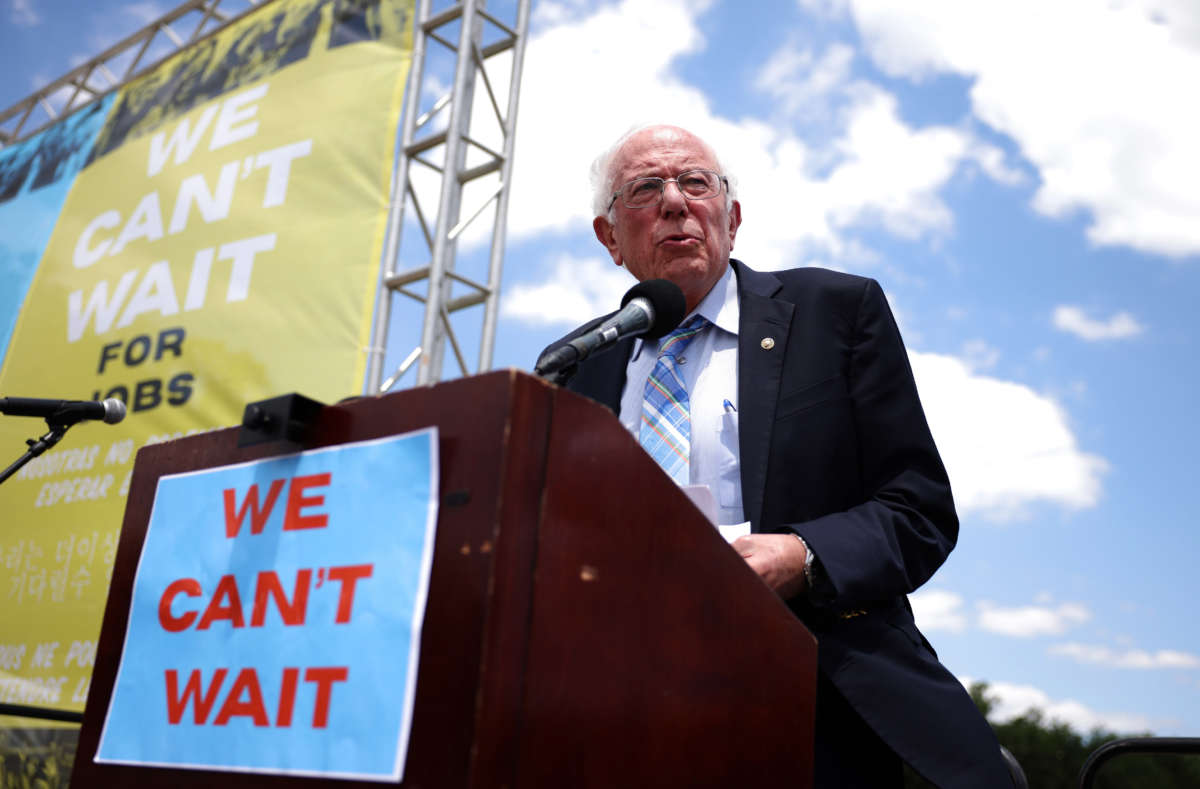Sen. Bernie Sanders (I-Vermont) confirmed on Wednesday that Senate Democrats’ $3.5 trillion reconciliation bill that is slated to be passed with a simple majority vote in the chamber will include elements of the pro-union PRO Act.
The PRO Act, or the Protecting the Right to Organize Act, is a sweeping bill meant to strengthen unions and make it easier for workers to organize in the U.S. It has been lauded by progressives and the labor movement as a strong and crucial beginning to empower the working class in the country and provide a platform to level the playing field between workers and employers.
As details of the reconciliation bill are still emerging, it’s still unclear which provisions of the PRO Act are included. One element that may be included is a proposal to create monetary penalties for companies violating labor laws, though that’s just one element of the broad pro-union proposal.
As the Senate parliamentarian demonstrated earlier this year when she shot down a $15 federal minimum wage proposal for the latest stimulus package, budget reconciliation comes with strict guidelines for what can and can’t be included in the process. In crafting the bill, then, Senate Democrats must toe a thin line — and work around potential objections by the centrist raft of their caucus.
The PRO Act, however, enjoys support from a wide swath of the Democratic Party. Pressure campaigns from labor activists convinced the conservative Sen. Joe Manchin (D-West Virginia) to back the proposal earlier this year. The bill passed the House in April but hasn’t been brought to a floor vote in the Senate since it would undoubtedly be shot down by Republicans and face the filibuster anyway.
Republicans stand staunchly against the PRO Act, favoring instead union-weakening provisions like so-called “right-to-work” laws that are aimed at kneecapping unions by allowing workers to join unions without paying dues. The PRO Act would override such laws. “Right-to-work” laws also end up having the effect of lowering workers’ wages, which the PRO Act, in spirit, is aimed at reversing.
On top of creating civil penalties for companies engaging in union-busting, the labor legislation also proposes outlawing tactics that companies commonly use to delay unionization, such as refusing to recognize a union and undermining the subsequent election process, tactics displayed by Amazon earlier this year. The PRO Act creates further restrictions on union-busting by requiring disclosure of such activities and closing loopholes that allow companies and contractors hired to discourage unions to skirt disclosure.
The PRO Act also proposes allowing gig workers to unionize alongside employees. This would be crucial for independent contractors like Uber and food delivery drivers, who, on top of working for low wages and without benefits, have suffered significant legal setbacks over the past year.
Though it’s yet unclear what provisions the parliamentarian, who still needs to review the bill, will allow, the Communications Workers of America union has said in an analysis that proposals like creating civil penalties for union-busting practices and classifying gig workers as employees could be included in the reconciliation process. It could also include proposals to restore a law undone by Donald Trump, which allowed union dues to be tax deductible while preventing companies from deducting expenses incurred in union-busting activities.
Even if many of the provisions laid out in the PRO Act don’t make it into the reconciliation bill, just the inclusion of some of its proposals could be monumental for advancing the labor movement. Unions have been on the decline due primarily to Republicans’ decades-long efforts to hamstring them and pursue loopholes in labor legislation and enforcement.
As union membership approaches all-time lows in recorded history, income inequality is now worse than it’s been since the Great Depression, according to the Economic Policy Institute (EPI). Indeed, workers are feeling the effects — an EPI report earlier this year found that the median full time worker is making $3,250 less per year than in 1979 because of declining unionization.
Though the Democrats haven’t yet shared a comprehensive summary on the $3.5 trillion bill — and though the $3.5 trillion mark is much lower than Sanders’s $6 trillion proposal — Sanders has expressed excitement over the bill. If it passes, the bill, which takes steps to expand Medicare coverage and tackle the climate crisis while taxing the wealthy and corporations, would be one of the most expansive legislations to pass into law since the New Deal, as lawmakers supporting the bill have said.
“In many ways, [the reconciliation bill] is the most consequential piece of legislation for working families since the Great Depression,” Sanders said on Twitter on Thursday. “It is my hope that this legislation will restore the American people’s faith in their government by proving that it works for them, not just the wealthy and powerful and their lobbyists.”
Join us in defending the truth before it’s too late
The future of independent journalism is uncertain, and the consequences of losing it are too grave to ignore. To ensure Truthout remains safe, strong, and free, we need to raise $27,000 in the next 24 hours. Every dollar raised goes directly toward the costs of producing news you can trust.
Please give what you can — because by supporting us with a tax-deductible donation, you’re not just preserving a source of news, you’re helping to safeguard what’s left of our democracy.
